Tech Tent: The CES 2018 Techie Awards
- Published
WATCH: Omron's ping pong-playing robot adapts its gameplay to suit different opponents
This week's Tech Tent is a special edition from Las Vegas with all the news from the greatest gadget show on earth, CES.
We meet a rather disturbing humanoid robot called Sophia, we hear about the latest move to rival Tesla with an electric autonomous car, and China's Baidu tells us that a huge smartphone population generating vast amounts of data could give it an edge in the battle for leadership in artificial intelligence.
As the show draws to an end, it's time to hand out some awards - let's call them the Techies.
The winners have been chosen after an exhaustive process by a jury made up of, well, me.

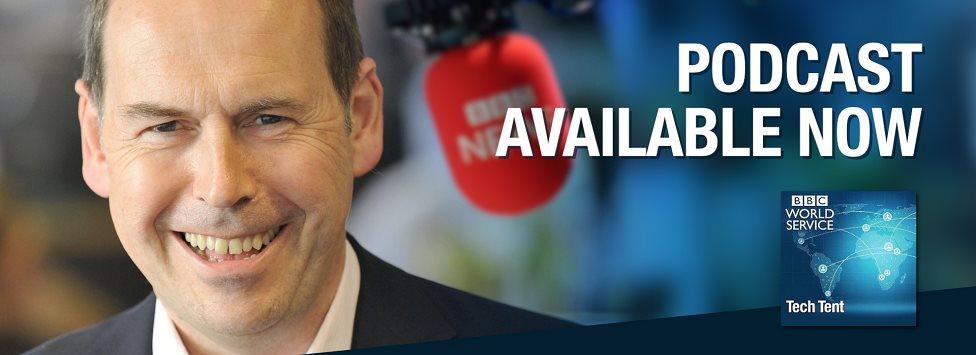
Stream the latest Tech Tent episode on the BBC website
Download, external the latest episode as a podcast
Listen to previous episodes on the BBC website
Listen live every Friday at 15.00 GMT on the BBC World Service

Best Performance
On Monday evening, while sheltering from the driving rain between live broadcasts outside the Bellagio Hotel, we looked up and saw something astounding and beautiful.
Dozens of tiny illuminated drones were hovering above the building's famous fountains, flying in formation and weaving patterns in the night sky.
WATCH: A total of 250 drones took part in Intel's Shooting Stars show
We came back the following evening to film the display and talk to Intel's Natalie Cheun, who runs the project, which has put on shows around the world.
She showed us one of the Shooting Star drones, which was far less sophisticated than we imagined - no cameras, just really good GPS, which combined with animation software keeps it flying in formation with others in the 250-strong fleet.
Now, in a week in which Intel is struggling with negative stories about the security of its chips, cynics would say the drone display is a useful distraction.
But it is harder and harder to create a sense of wonder about new technology, so I for one was grateful to be able to look up at the sky and say: "Wow!"

Best Robot
You could hardly move for robots on the show floor this week. Sony's latest version of its robo-dog Aibo was charming everybody.
WATCH: Sony's chief executive explains the appeal of its reborn robot dog Aibo
But I'm not convinced I will be trading in my real dog, even though chief executive Kaz Hirai proudly told me Aibo was very smart and connected to the cloud.
Kuri was one of a number of companion or entertainment robots demanding entry to our homes.
You may like the idea that it wanders around snatching five-second video clips of what the family is up to, or you may want to put a bag over its head and lock it in the cupboard.
Too many of our new android friends appear to be confused about their roles in our lives.
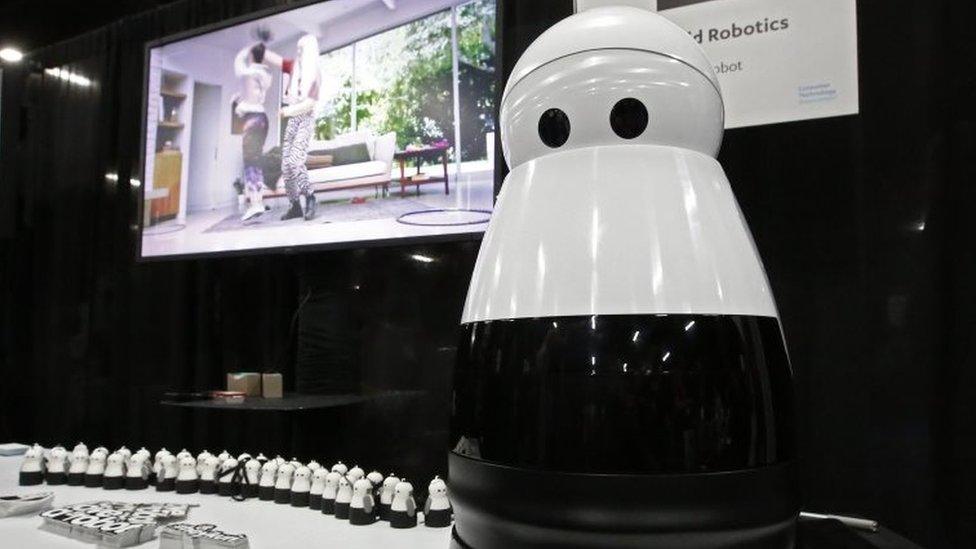
Mayfield Robotics' Kuri can livestream video, play music and patrol the home
That is why the award goes to Forpheus, the table tennis robot from Japan's Omron.
It knows exactly what it's about - playing ping pong - and it is also kind. After sending your wheezing correspondent racing fruitlessly around the table for a while, it eased up and even started making a few unforced errors.

Worst Idea
This was a fiercely contested category, given how many dodgy gadgets pop up at CES.
No, I don't want to aerate my wine and my toothbrush is quite intelligent enough already, thank you.
But the winner by a mile is Kodak. As if to compensate for missing out on the digital camera boom, it has leapt aboard the crypto-currency and blockchain bandwagon.
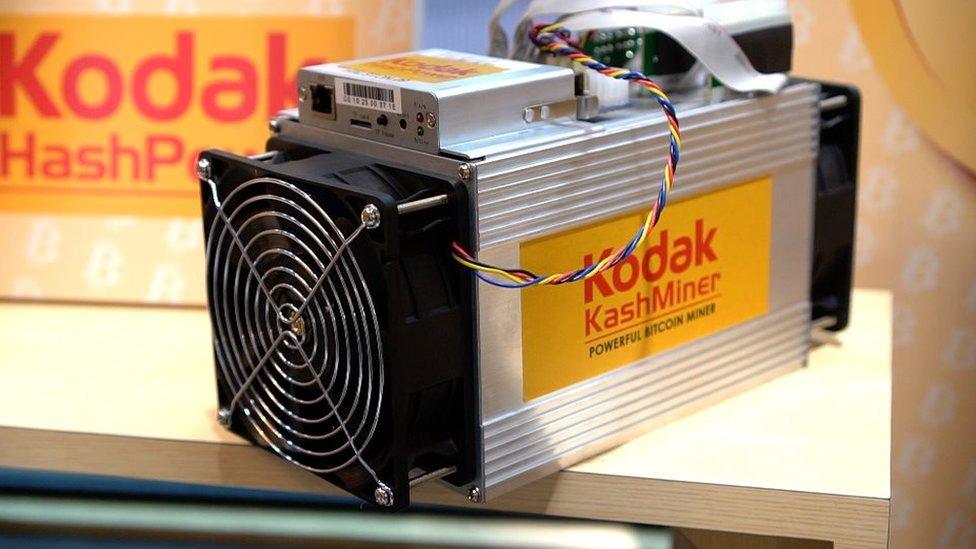
Kodak is to rent out Bitcoin mining rigs to the public
In a move that smacks of desperation, the company wants photographers to sign up for a scheme that will see their work registered for posterity using that magical creation blockchain, earning payments in Kodakcoin - a currency of uncertain value or usefulness.
But it gets worse. The photography firm is also launching the Kodak KashMiner, which will allow anyone to become a Bitcoin miner.
The idea is you rent the machine, and pay half the profits to Kodak, with the promise of a decent return on the upfront entry fee for the scheme.
As Bitcoin experts pointed out, there are as many holes in this idea as a Swiss cheese - the price of Bitcoin is volatile, the energy costs are bound to soar and the crypto-currency is designed to get ever harder to mine.
Still, investors liked it, sending Kodak shares soaring threefold at one point.
Maybe they have studied blockchain technology and Bitcoin mining, and have reached a sober judgment of their value to Kodak. Or maybe not...

Best Snack Selection
CES will leave you with sore feet and indigestion, scoffing unhealthy food proffered by tech firms at news conferences, washed down with terrible coffee.
But Baidu did things differently, welcoming visitors to its event at an elegant hotel with exquisite canapes and Lapsang Souchong tea.

Even better, the Chinese company then cut through the usual tech jargon and corporate waffle with a clear message: we've got the experts, we've got the data, we've got a huge population, we are going to crush it in the battle to dominate AI.

Gender Diversity Award
The award for services to gender diversity goes to the show's organiser the Consumer Technology Association.
Huge posters in the Las Vegas Convention Center showed a wide range of women speakers in the conference programme.
Actually, scrap that. The posters were a response to anger that all the main keynote speeches at CES were being made by men.
Suddenly, the CTA decided having posters of Intel's Brian Krzanich and Ford's Jim Hackett and Richard Yu of Huawei looming over the attendees was not such a hot idea. So, it featured instead some of the women on panels lower down the bill.
I'm not sure that quite does the trick in an industry notably lacking in diversity.
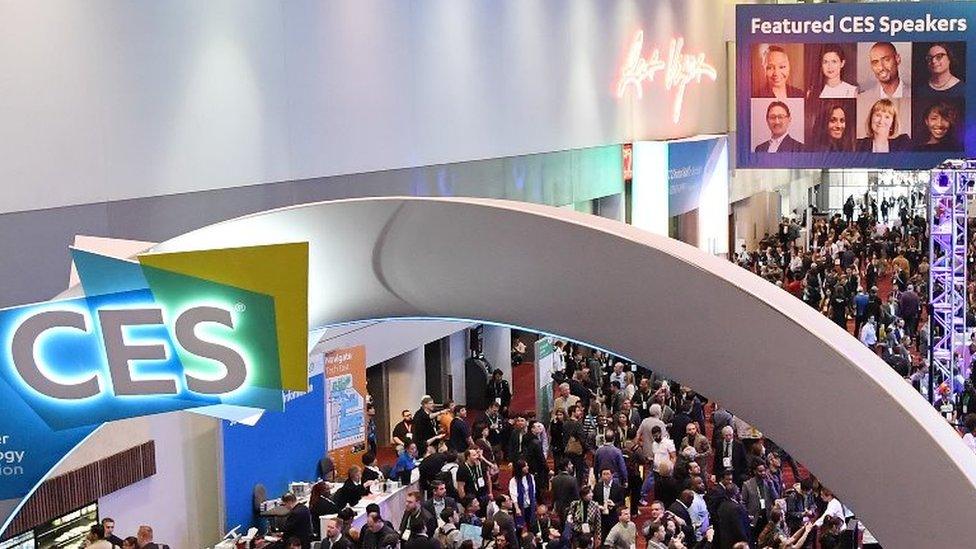
CES banners said its featured speakers came from "diverse backgrounds and... different genders"
After all, many of the tech firms exhibiting here have only just got round to thinking that "booth babes" - scantily clad women enticing visitors to come and see the products - are not such a great idea.
Let's instead give the award to tech writer Kara Swisher.
She dropped in briefly to Las Vegas to - as she tweeted, external - "show dudes some not-dudes know tech" with a panel of top female tech executives.

The Courage Award
Some tech entrepreneurs just don't know when they are beaten.
Last year we featured the story of Danny Manu, who jetted in from Manchester on a budget flight to try to promote his Clik instant translation earbuds.
We thought he faced a hard time up against the likes of Google and so it proved - a year later his earbuds, which he said would go on sale early in 2017, are still only available to pre-order.
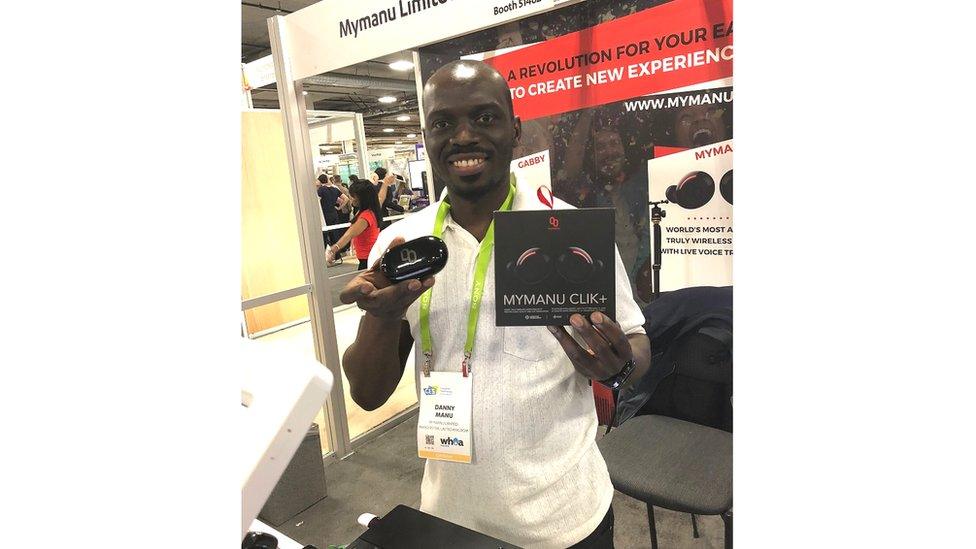
Danny has delivered his earbuds to some of his crowdfunding backers but has yet to release them to the wider public
But he was back at CES in the Eureka Park start-up zone with his own little stand that had cost him a pretty penny.
He is still optimistic that his earbuds can be a huge success.
Given the fact that Google's Pixelbuds turned out to be pretty lame, maybe he stands a chance.